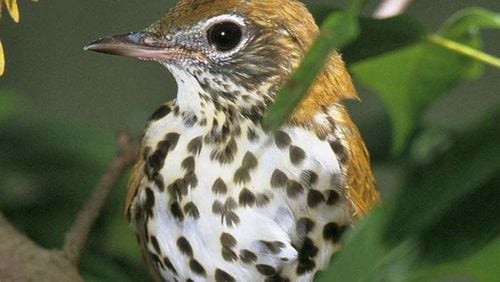If you ask Georgia birders what bird has the sweetest song during spring and summer, their answer most likely will be the wood thrush. Some even believe the wood thrush’s song is the most beautiful bird song in all of North America.
A cinnamon-brown songbird with a white spotted breast, the wood thrush is back in Georgia for its nesting season after spending winter in the moist tropical forests of Mexico's Yucatan peninsula and Panama. Its ringing, flute-like ee-o-lay song can be heard now in deciduous woodlands all over Georgia, especially at dawn and dusk.
To hear it, visit: allaboutbirds.org/guide/Wood_Thrush/sounds
The song, said American writer Henry David Thoreau, “declares the immortal wealth and vigor that is in the forest.”
RELATED: Atlanta’s Old-Growth Forests gain national recognition
Unfortunately, the wood thrush also has become a symbol of declining neotropical songbirds, which are in the southern tropics during winter and nest during summer in North America.
Since the 1970s, the number of wood thrushes breeding in the United States has decreased about 60 percent, according to the Smithsonian Migratory Bird Center. Reasons for its decline include climate change, collisions with buildings during migration, nest parasitism by cowbirds and degradation of both its summer and winter forest habitats.
RELATED: Trilliums: The floral stars of early spring in Georgia’s woodlands
Georgia birders are concerned about the wood thrush. "We've all noticed its ethereal song disappearing from Georgia's forests over several decades," stated the Atlanta Audubon Society.
That’s why it has chosen the wood thrush for its 2017 species-specific campaign, in which it will promote actions that birders, homeowners, school groups and others can take to help the struggling bird.
The society said one thing you can do to help the wood thrush—and other songbirds as well—is to plant more native plant species that the birds feed on, such as American beautyberry, Virginia creeper, American holly, pokeweed, black cherry, black gum, blueberry and magnolia.
OTHER NEWS:
IN THE SKY: From David Dundee, Tellus Science Museum astronomer: The moon will be last quarter on Thursday. Mercury and Venus are low in the east around dawn. Mars is very low in the west at dusk. Jupiter is high in the east around sunset. Saturn rises out of the east around dusk and will appear near the moon tonight.






